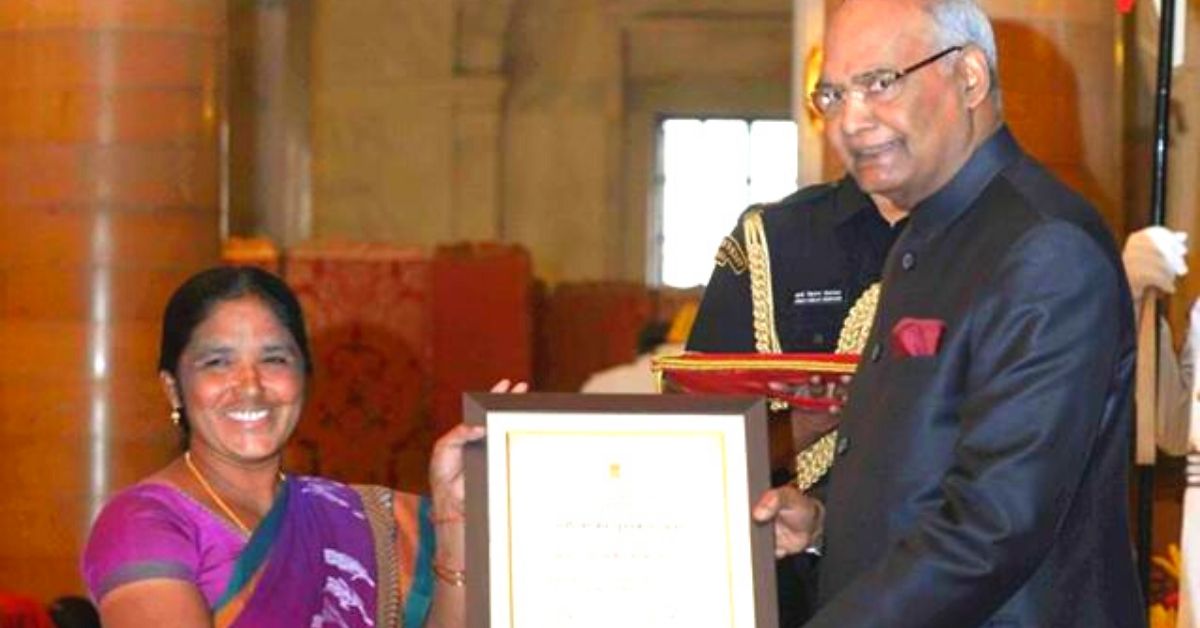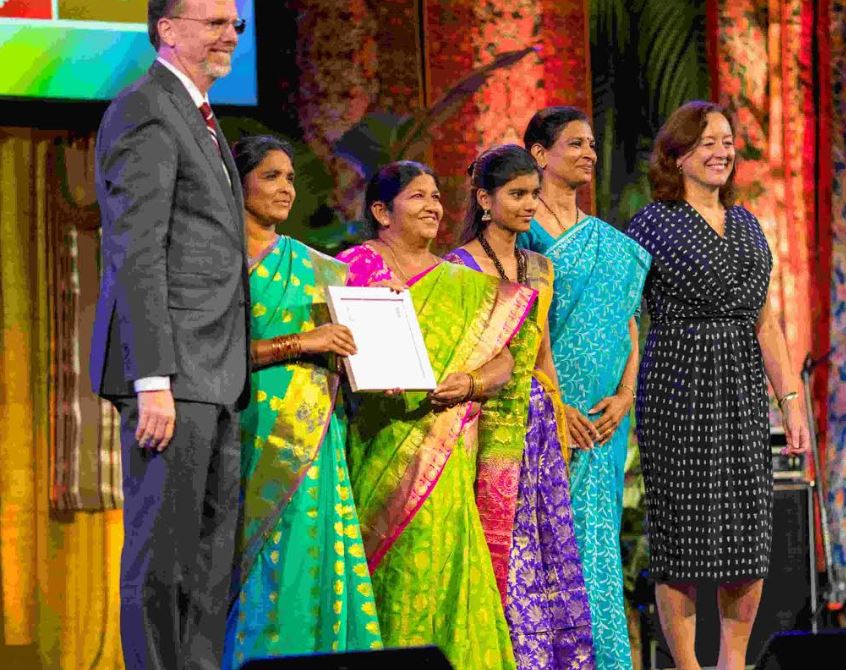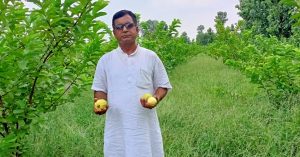36-YO Woman Smashes The Patriarchy, Grows 25 Varieties of Millet With Rainwater!
Mogulamma lost her husband, failed multiple times and faced days when she couldn’t afford a meal. Despite it all, she refused to bow down, and continued to fight like a warrior.

After being shackled in deep-rooted patriarchy for almost 25 years, the day Mogulamma got an opportunity to be in charge of her family’s farm, she did not take a second to rise up to the challenge. In the process, she broke free and formed her own identity.
Today, the 36-year-old grows millets organically in her two-acre land all by herself and is widely known cross Telangana known for cultivating 25 varieties of millets.
Want to grow your own farm but do not have space? Check out this cost-effective mini hydroponic growing kit for in-house farming.
In 2018, on International Women’s Day (March 8) Mogulamma received the prestigious Nari Shakti Award from President Ramnath Kovind on behalf of All India Millet Sisters Network (AIMSN), a pan India collective of women farmers across India who grow millets organically.
The recognition did not stop there. In September 2019, she travelled to New York to receive the ‘Equator Prize’ conferred by the United Nations Educational, Scientific and Cultural Organization (UNESCO) for environmental conservation efforts.
However, when Mogulamma looks back at her journey, it still feels like a dream.

Stepping into her Mother-In-Law’s Shoes
Mogulamma belongs to Telangana’s Potpalli Village in Sangareddy District. She got married in her early 20s, and for the next five years, she dedicated herself to the family.
What made her in-laws’ household different from the rest, was the way her mother-in-law looked after their ancestral fields while being a homemaker. She was an active member of AIMSN (All India Millet Sisters Network), an initiative started by Deccan Development Society (DDS) eight years ago to promote sustainable farming and financially empower the local women.
DDS, started by Satheesh PV, is an NGO that works for environmental causes with the help of rural women.
A couple of years ago, after her mother-in-law passed away, Mogulamma stepped in and decided to continue her legacy by occupying her position in AIMSN. Around the same time, her husband fell ill and was bed-ridden. Therefore, the pressure to earn for the family was entirely on her.
Interestingly, there was nothing ceremonious about the handover. It was as organic as it could get.
“When my family and DDS proposed that I look after millet production, I said yes immediately as it was a family legacy and also because there was no other option. But it was life-changing for me. Suddenly, I found a whole new level of respect for myself. Of course, there were apprehensions about managing both, my family and farm, but I decided to walk over my fear and take the plunge,” she recalled in a conversation with The Better India.

AIMSN and the Emancipation of Women Farmers
AIMSN is a one-of-its-kind network which was formed by 100 women residing in different parts of the country to assist women farmers in millet farming. Women who receive training, in turn, train other local women.
Use of chemicals and fertilisers is strictly prohibited. Instead, alternatives like vermicompost, farmyard manure and panchgavya are used to keep insects at bay and provide nutrition to the crops.
Explaining the reason behind choosing millets over any other crop, Satheesh tells TBI:
“Millet is not a crop; it is a concept. We live in times where every region faces a drought-like situation. Growing millets is a solution to climate change as they do not consume a lot of water. Apart from the environment security, millet has health benefits as well. It is not commercially viable unlike cotton and sugar, and hence, women usually grow them for self-consumption. However, the undermined crop is in demand which many women are not aware of. Thus, we decided to bank on traditional custom and generate revenues.”
The role of AIMSN does not stop there as women are taught marketing strategies so that they can sell their produce. A direct network is formed between consumers and farmers, thus eliminating the need for middlemen.
“We have our group to market millet-based products and grains. Women farmers make all the decisions regarding prices and export-import. We sell millets at premium prices in urban areas, and the profits are invested in our rural model, which sells millets at 10 per cent less rates to the villagers without affecting incomes of women farmers,” says Satheesh.
Mogulamma’s Farming Journey
Before the onset of every monsoon, Mogulamma prepares natural fertilisers, through vermicomposting. “I add cow’s urine and dung and farm waste in a pit and to fasten the process, leave worms on them. They feed on the waste, breaking them down quickly. The process is hassle-free, and manure is ready within 20 days,” she shares.
One of the biggest advantages of millet is its low water requirement.
“Unlike rice which consumes 5,000 litres of water per kilo, millets need 250 litres. Therefore, there is no need to save water in case there are uneven rains. Even if it rains for a couple of days, it is sufficient for my farm.”
A few months into farming, Mogulamma’s millet knowledge grew exponentially, thanks to DDS. Earlier, she only cultivated two varieties of millet, but after receiving agricultural inputs by DDS, the types increased to 25.
Things did not immediately change for good after she joined DDS. She lost her husband in the process, failed multiple times to make effective natural fertilisers and faced days when she couldn’t afford a meal.
Despite all that, Mogulamma refused to bow down in front of troubled times and continued to fight like a warrior. It was around this time that she joined the village-based group named ‘Daughter-in-law Sangham’ to encourage women like her to become self-sufficient. The sangham is an informal group of daughters-in-law who come together and hold discussions on millet farming.
Mogulamma mobilises local women through the sangham. However, it was not an easy task. It took a lot of convincing before rural women joined the group.
“Many women were hesitant to ask their husbands to lend them a small part of their farmland. Some also believed that to grow millets, big farm size is necessary. From addressing issues to helping them lease lands, I tried to be with them at every step,” she says
Mogulamma’s now spends most of her time with AIMSN, which has now become her professional family. She hopes to emancipate as many women as she and continue growing millets till her last breath.
Featured Image Source: Deccan Development Society/Facebook
Also Read: This Amazing 49-YO Single Mother Has Planted 2 Million Trees Across 22 Villages!
(Edited by Gayatri Mishra)
Like this story? Or have something to share?
Write to us: [email protected]
Connect with us on Facebook and Twitter.

Similar Story

‘I Took A Risk & Won’: Wheat Farmer Switched to Growing Lemons, Earns Rs 7 Lakhs Per Harvest
Observing the year-round demand for lemons, Anand Mishra switched from growing traditional crops like wheat, paddy, and peas to cultivating lemons in Uttar Pradesh. With his two-acre farm now yielding Rs 7 lakh in profits, he explains the reasoning behind this ‘unconventional’ change.
Read more >
If you found our stories insightful, informative, or even just enjoyable, we invite you to consider making a voluntary payment to support the work we do at The Better India. Your contribution helps us continue producing quality content that educates, inspires, and drives positive change.
Choose one of the payment options below for your contribution-
By paying for the stories you value, you directly contribute to sustaining our efforts focused on making a difference in the world. Together, let's ensure that impactful stories continue to be told and shared, enriching lives and communities alike.
Thank you for your support. Here are some frequently asked questions you might find helpful to know why you are contributing?


This story made me
-
97
-
121
-
89
-
167












